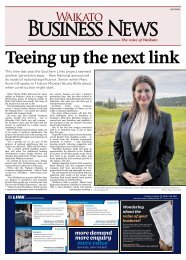Waikato Business News August/September 2023
Waikato Business News has for a quarter of a century been the voice of the region’s business community, a business community with a very real commitment to innovation and an ethos of cooperation.
Waikato Business News has for a quarter of a century been the voice of the region’s business community, a business community with a very real commitment to innovation and an ethos of cooperation.
- No tags were found...
Create successful ePaper yourself
Turn your PDF publications into a flip-book with our unique Google optimized e-Paper software.
10 WAIKATO BUSINESS NEWS, AUGUST/SEPTEMBER <strong>2023</strong><br />
CONVERSATIONS WITH MIKE NEALE OF<br />
NAI HARCOURTS HAMILTON<br />
Mike Neale, Managing Director, NAI Harcourts Hamilton<br />
New Tenant Interest?<br />
- Role of your<br />
Commercial Agent<br />
This is a leasing market where we are<br />
starting to see some warning signs<br />
– with increasing vacancy rates,<br />
Landlords are often keener to get a Tenant<br />
signed up and less reputable Tenants see<br />
this as an opportunity. For Landlords, not<br />
every not every Tenant is a good tenant<br />
and sometimes it can be best to steer clear.<br />
What are some of the warning signs?<br />
• Asking to draw up a lease offer without<br />
having seen the property<br />
• A long term lease offer at the asking<br />
rental, along with a significant rent<br />
free period<br />
• Asking for a significent cash contribution<br />
to fitout<br />
• Asking to reduce the deposit to one<br />
months rental<br />
• Asking to defer payment of the<br />
deposit<br />
• They don’t have a solicitor<br />
The downside to signing a commercial<br />
lease with a poor or undesirable<br />
tenant, has various downsides<br />
and risks for a landlord.<br />
These include:<br />
a) Non-payment of rent: Disreputable<br />
tenants may have a history of<br />
not paying their rent on time, or at<br />
all. This can result in a loss of rental<br />
income and financial/emotional<br />
strain on the property owner.<br />
b) Property damage: Problem tenants<br />
may not take good care of the<br />
property, leading to damage that<br />
can be costly to repair. They might<br />
also make unauthorized alterations<br />
to the space, which could further<br />
devalue the property.<br />
c) Legal issues: Disreputable tenants<br />
may engage in illegal activities<br />
on the premises, such<br />
as drug manufacturing<br />
or distribution, which<br />
can lead to legal troubles<br />
for the property<br />
owner. If such a<br />
tenant engages in illegal<br />
activities or causes<br />
harm to others on the<br />
property, the property<br />
owner could potentially be held<br />
liable for damages or injuries.<br />
d) Eviction difficulties: If a tenant with<br />
a bad reputation refuses to vacate<br />
the premises when the lease is terminated,<br />
it can be challenging and<br />
costly to evict them through the<br />
legal process. This can result in a<br />
prolonged vacancy period and lost<br />
rental income.<br />
e) Insurance invalidation: Unauthorized<br />
uses and alterations may invalidate<br />
your insurance policy.<br />
f) Increased management workload:<br />
Dealing with a problem tenant can<br />
be time-consuming and stressful.<br />
You may need to invest more time<br />
and resources in property management<br />
and legal proceedings.<br />
To mitigate these risks, it’s essential<br />
for landlords to conduct thorough tenant<br />
screening, including background checks<br />
and references, before entering into a lease<br />
agreement. Some of this should be undertaken<br />
initially by the Agent and some by<br />
the Landlord or their legal advisor.<br />
Additionally, having a well-drafted<br />
lease agreement that clearly outlines<br />
expectations and consequences for lease<br />
violations can help protect the landlord’s<br />
interests. Seeking legal advice or consulting<br />
with property management professionals<br />
can also provide valuable guidance in<br />
dealing with disreputable tenants and minimizing<br />
potential downsides.<br />
What should I expect from my real<br />
estate professional?<br />
While it can be a fine line between what<br />
information you can ask for and what is<br />
commercially sensitive or an over reach,<br />
the following are some items you might<br />
consider asking:<br />
• Do they own any assets, such as a<br />
house?<br />
• Can their accountant provide a<br />
statement of position?<br />
• Can they provide a rental bond or<br />
even a bank guarantee?<br />
• Could the rental be maintained 3<br />
months in advance at all times?<br />
• Does anybody in their office know<br />
of this potential tenant ? have they<br />
asked around?<br />
• Can we find out who their previous<br />
Landlord was and talk to them, or<br />
even the Landlord for where they are<br />
currently living?<br />
• Should a credit check be completed?<br />
• If they are on an overseas passport,<br />
do they have appropriate visa’s and<br />
how long do those visa’s last?<br />
I believe that a competent commercial<br />
agent should give you<br />
good advice and be able to act<br />
as a sounding board for suggestions,<br />
as how to mitigate<br />
any potential issues. As a<br />
team, we constantly strive<br />
to provide advice and solutions<br />
that mitigate risk for<br />
our clients.<br />
We had a recent case where a<br />
potential tenant enquired. Fortunately,<br />
within our office we try to keep an eye on<br />
the Public Notices in the <strong>Waikato</strong> Times<br />
and application notices for liquidation etc<br />
– in this instance, one had shown up several<br />
months priors, for the same director.<br />
A copy of the notice was provided to<br />
the potential Landlord and a face-to-face<br />
meeting set up between the two of them,<br />
which the agent also attended. The Landlord<br />
is an experienced commercial owner,<br />
so the landlord works were limited and a 3<br />
month deposit was agreed and paid before<br />
the keys were handed over. Thus, the landlord<br />
was fully informed of the risks before<br />
a decision was made and hopefully mitigating<br />
as much as possible, any risk.<br />
Under Real Estate Agents Act 2008<br />
we advise all parties that they need to<br />
seek their own legal and other professional<br />
advice before signing anything<br />
NAI Harcourts Hamilton<br />
Monarch Commercial Ltd MREINZ Licensed<br />
Agent REAA 2008<br />
Cnr Victoria & London Streets, HAMILTON<br />
07 850 5252 | hamilton@naiharcourts.co.nz<br />
www.naiharcourts.co.nz<br />
Tech Talk: User<br />
Experience and User<br />
Interface design is<br />
about more than<br />
look and feel<br />
There is a misconception that user<br />
experience (UX) and user interface<br />
(UI) design exist to make a system<br />
look and feel good.<br />
This is just scratching the<br />
surface.<br />
The role of a UX<br />
specialist is to ensure that a<br />
product goes to market with<br />
the greatest chance of success.<br />
This is made possible by working<br />
to understand the needs<br />
of a system’s users, and creating<br />
a user-friendly product<br />
that helps real people get their<br />
tasks done.<br />
When you’re going to market<br />
with a product, you need<br />
to have strong marketing and<br />
sales strategies behind it.<br />
Investing in great<br />
design means<br />
getting it right the<br />
first time.<br />
You’ll want to put extra<br />
thought into the onboarding<br />
experience and keep an eye<br />
on adoption rates and churn,<br />
you need to know exactly how<br />
many people are using your<br />
system.<br />
The development team and<br />
client need to work closely<br />
together to ensure the product<br />
achieves your sales objectives,<br />
minimises churn, and maximises<br />
adoption.<br />
But in terms of what goes<br />
into the user interface, if you're<br />
selling the product that you're<br />
building, then you probably<br />
want to think about when are<br />
the key moments in this experience<br />
that we close the deal<br />
or upsell the customer a larger<br />
plan? Thinking about where<br />
are the sales opportunities<br />
within the context of the user<br />
experience? How are we going<br />
to excite and delight, entice?<br />
Often when a product is<br />
falling short in the market,<br />
businesses will say they’re<br />
wanting to improve adoption<br />
or retention rates.<br />
When we review the user<br />
interface, we can identity UX<br />
and UI issues that are inhibiting<br />
success.<br />
Software businesses want<br />
to improve conversion, adoption<br />
and retention rates, and<br />
look to marketing and commercial.<br />
However sometimes<br />
when the stone is turned over<br />
to have a look at the product<br />
there are UX issues and opportunities<br />
missed to delight<br />
users!<br />
Investing in great design<br />
means getting it right the first<br />
time.<br />
Another way to think about<br />
it is, without investment in<br />
good design, businesses run<br />
the risk of paying the high<br />
price tag for a product that<br />
ultimately fails in the market.<br />
TECH TALK<br />
BY BRIANA CHRISTEY<br />
Briana Christey is a<br />
user interface and user<br />
experience consultant at<br />
<strong>Waikato</strong> software specialist<br />
Company-X.<br />
This can tarnish their brand<br />
reputation and puts them<br />
in a tricky decision to either<br />
cut their losses or try again<br />
by reinvesting good design,<br />
rebuilding and rebranding<br />
which can come at a very large<br />
cost.<br />
There's a well-known quote<br />
from former Jaguar chief executive<br />
Ralf Speth that summarises<br />
it well: "If you think<br />
good design is expensive, you<br />
should look at the cost of bad<br />
design."<br />
Often the problem is cluttered<br />
and confusing UI that<br />
results in a high cognitive load<br />
for the user to navigate and low<br />
overall product satisfaction.<br />
Achieving simplicity in<br />
design requires real understanding<br />
of users, so that the<br />
UI can be designed to exactly<br />
what they need, at the right<br />
time, and in the right order in<br />
their intuitive journey to complete<br />
tasks.<br />
Without a doubt, quality<br />
of design is directly related to<br />
product success in the market.

















